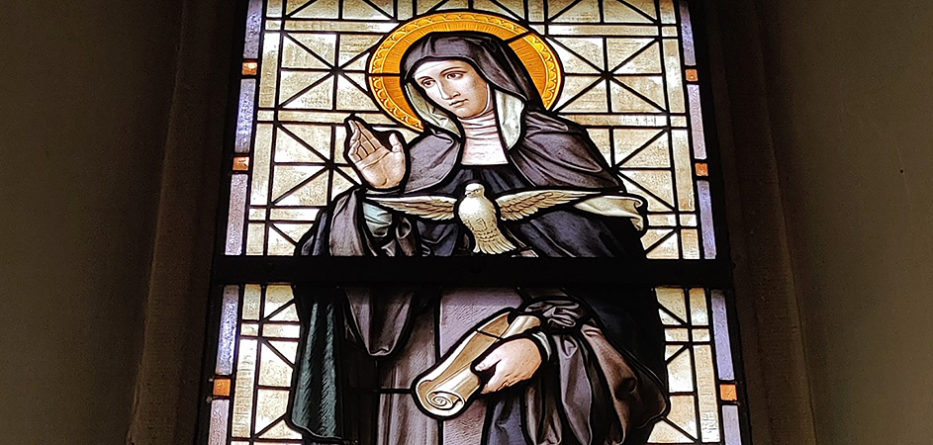Scholastica of Subiaco, Hilda of Whitby, Hildegard of Bingen, Catherine of Sienna, Teresa of Ávila and Mary MacKillop all in their own time and their own way either lead or challenged their brothers to see certain matters from a different perspective. So, in this reflection, I would like to share what one of these women, a Benedictine nun, might have to offer us for further reflection.
Born approximately 480AD, St. Scholastica of Nursia (her name means ‘learned woman’) was the twin sister of St Benedict, the founder of Benedictine and Western Monasticism. She ruled a monastery under his direction five miles from Monte Cassino, his own monastery. Not much is recorded of her life. We do, however, have an interesting story from “The Dialogues” of Pope St. Gregory the Great, who wrote the life of St Benedict. (Gregory was a Benedictine monk before being elected Pope.)
Pope St Gregory recounts the annual visit of Scholastica to Benedict at Monte Cassino:
As the evening shadows fell Benedict told her that they both needed to get back to their respective monasteries before dark and the time for the night silence. Scholastica wanted to stay on and talk more of heavenly things but Benedict remonstrated with her for wanting to break the rule by being away from their monasteries during the night silence. There followed somewhat of a verbal scuffle, one without resolution as neither would give way. Finally, Scholastica put her head down on the table and prayed to God to make it rain. She won the day: the rain poured down in torrents as lightning and thunder raged leaving them no option but to stay put, whereupon he said to her: “God forgive you Sister what have you done?” She replied, “I asked a favour of you and you would not listen. I asked it of God and he granted it. Set off now if you can: Leave me and return to your monastery”. And so it was that they talked of heavenly things until morning.
I wondered how we might interpret this story within the context of today’s Church. Pope St Gregory gives us a little help when he comments that the woman won because she loved much.
It seems Benedict cared too much about sticking to the rule, which he himself had written, and in which being home by nightfall and night silence was, and still is, sacrosanct. Does it perhaps say that sometimes it is appropriate to break rules for the sake of love? In his Dialogues, St Gregory makes the point that it was the prayer of a woman that God chose to hear because it was the woman who could see the path of love more clearly. His words from “The Dialogues” are:
He (Benedict) found, however, that a miracle prevented his desire. A miracle that, by the power of almighty God, a woman’s prayers had wrought. Is it not a thing to be marvelled at, that a woman, who for a long time had not seen her brother, might do more in that instance than he could? She realized, according to the saying of St. John, ‘God is charity’ [1 John 4:8]. Therefore, as is right, she who loved more, did more.
This is not to say that it is always the case that a woman sees the path of love more clearly. Far from it. What I am wondering however is, whether there is a message here for the men of today’s Church to meditate on: are there times perhaps when things are not black and white?
Perhaps it’s a message for us all. Deep inner listening requires of us that we be prepared to change our mind at times, because the Holy Spirit might very well choose to speak through a woman, or the younger, or the marginalised, the poor the ostracised and the broken.
I guess this could have been a very hard lesson for Benedict to learn, especially since one of the key values of his rule is the capacity to listen: to be able to hear God’s word coming to us through a multitude of channels. In his Chapter on Calling the Brothers for Counsel, he even stipulates that all should listen to the youngest member too as “the Holy Spirit often reveals what is better to the younger” (RB 3:3). He insists that all should be called to Counsel.
Being able to listen is the key: to listen to the other, whoever they may be, whatever their standing, their position, their wealth, their age. It is to listen with great openness, respect, humility, and with a willingness to admit to being wrong sometimes.
Perhaps it is both men and women who have a lesson to take away from St Scholastica. Having experienced his own rigidity and weakness Benedict seems to have done so, as his rule attests.
Sr Antonia Curtis OSB is a member of the Benedictine Sisters community at Jamberoo Abbey, NSW. Sr Antonia thanks Sr Maureen Therese Woodhouse OSB for her historical research for this reflection.
You can read the full series of six reflections by Sr Antonia Curtis:
- Gifts from the past – St Teresa of Ávila
- Gifts from the Past – St Scholastica of Nursia
- Gifts from the Past – Saints Hilda of Whitby and Hildegard of Bingen
- Gifts from the Past – St Catherine of Siena
- Gifts from the past – St Mary of the Cross MacKillop
- Gifts from the past – Conclusion








